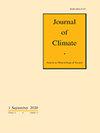Observed Changes in Extreme Precipitation Associated with United States tropical cyclones
IF 4
2区 地球科学
Q1 METEOROLOGY & ATMOSPHERIC SCIENCES
引用次数: 0
Abstract
Abstract Numerous recent tropical cyclones have caused extreme rainfall and flooding events in the CONUS. Climate change is contributing to heavier extreme rainfall around the world. Modeling studies have suggested that tropical cyclones may be particularly efficient engines for transferring the additional water vapor in the atmosphere into extreme rainfall. This paper develops a new indicator for climate change using the enhanced rainfall metric to evaluate how the frequency and/or intensity of extreme rainfall around tropical cyclones has changed. The enhanced rainfall metric relates the amount of rain from a storm over a given location to the 5-year return period rainfall in that location to determine the severity of the event. The annual area exposed to tropical cyclone-related 5-year rainfall events is increasing, which makes a compelling climate change indicator. Quantile regression illustrates that the distribution of tropical cyclone rainfall is also changing. For tropical storms, all quantiles are increasing. However, major hurricanes show large increases in their most extreme rainfall. This study does not attempt to make any detection claims (vs. natural variability) or attribution of the observed trends to anthropogenic forcing. However, the sensitivity of the results to natural variability in tropical cyclone frequency was somewhat constrained by comparing two decades from the previous active era (1951–1970) with two from the current era (2001–2020). This comparison also shows that both the mean and maximum rainfall associated with tropical cyclones is increasing over most areas of the eastern CONUS with the most significant increases from northern Alabama to the southern Appalachians.与美国热带气旋有关的极端降水量观测变化
摘要 近期多次热带气旋在美国中部地区造成极端降雨和洪水事件。气候变化导致全球极端降雨量增加。模型研究表明,热带气旋可能是将大气中的额外水汽转化为极端降雨的特别有效的引擎。本文利用增强降雨指标开发了一个新的气候变化指标,以评估热带气旋周围极端降雨的频率和/或强度发生了怎样的变化。增强降雨量指标将特定地点的风暴降雨量与该地点的 5 年重现期降雨量联系起来,以确定事件的严重程度。每年受热带气旋相关 5 年降雨量事件影响的面积在增加,这是一个令人信服的气候变化指标。量值回归表明,热带气旋降雨量的分布也在发生变化。就热带风暴而言,所有量值都在增加。然而,主要飓风的最极端降雨量出现大幅增加。本研究并不试图对观测到的趋势进行任何检测(相对于自然变异)或将其归因于人为影响。不过,通过比较上一个活跃期(1951-1970 年)的两个十年与当前活跃期(2001-2020 年)的两个十年,在一定程度上限制了研究结果对热带气旋频率自然变化的敏感性。这种比较还表明,在美国东部大部分地区,与热带气旋相关的平均降雨量和最大降雨量都在增加,从阿拉巴马州北部到阿巴拉契亚山脉南部的增加最为显著。
本文章由计算机程序翻译,如有差异,请以英文原文为准。
求助全文
约1分钟内获得全文
求助全文
来源期刊

Journal of Climate
地学-气象与大气科学
CiteScore
9.30
自引率
14.30%
发文量
490
审稿时长
7.5 months
期刊介绍:
The Journal of Climate (JCLI) (ISSN: 0894-8755; eISSN: 1520-0442) publishes research that advances basic understanding of the dynamics and physics of the climate system on large spatial scales, including variability of the atmosphere, oceans, land surface, and cryosphere; past, present, and projected future changes in the climate system; and climate simulation and prediction.
 求助内容:
求助内容: 应助结果提醒方式:
应助结果提醒方式:


